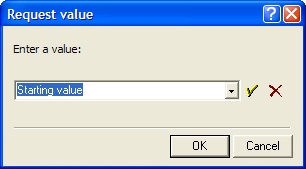
GetValue
The GetValue function opens a dialog to request a string or value. If you click [OK], the entered string is returned to the script and saved to a history list for the dialog. The current string is shown in the edit field of the list box. The remaining items in the list box show a history of strings that have been recently used and which may be selected. This function is similar to GetString except that a history list is maintained.
|
|
|
sStr, bOK = GetValue()
sStr, bOK = GetValue( s )
sStr, bOK = GetValue( s, sPrompt )
sStr, bOK = GetValue( s, sPrompt, sTitle )
sStr, bOK = GetValue( s, sPrompt, sTitle, sRegistry )
sStr, bOK = GetValue( s, sPrompt, sTitle, sRegistry, sTooltip )
![]() s is the
initial string. If nil,
a blank string is used.
s is the
initial string. If nil,
a blank string is used.
![]() sPrompt is
the message above the string field. If nil, a default is used.
sPrompt is
the message above the string field. If nil, a default is used.
![]() sTitle is
the window title. If nil, a default is used.
sTitle is
the window title. If nil, a default is used.
![]() sRegistry
is the key for the history list in the Windows Registry. If
nil, the default
registry is used.
sRegistry
is the key for the history list in the Windows Registry. If
nil, the default
registry is used.
![]() sTooltip is
the string for a popup Tooltip. If nil, no Tooltip is used.
sTooltip is
the string for a popup Tooltip. If nil, no Tooltip is used.
![]() If
[OK] is clicked,
the string sStr and the button bOK=true
are returned
If
[OK] is clicked,
the string sStr and the button bOK=true
are returned
![]() If
the dialog is canceled, "",false is
returned.
If
the dialog is canceled, "",false is
returned.
All arguments are optional and assume default values beyond the last argument you specify. To use a default argument but follow it with a specified argument, use a nil in its place.
This function maintains a history list in the Windows registry. By choosing different names for the sHistory argument, you can have different history lists for different instances of the dialog. If [OK] is clicked, the string is added to the history list and returned as the value sStr.
Although this function returns a string, it can also be used to fetch numbers. After the function returns, the calling module can convert sStr to a number using the Lua function tonumber(). Of course, Lua allows implicit conversion; when a number is needed but a string form of the number exists, Lua will automatically attempt to convert the string to a number.
The window shown above was created using the following code, specifying on the initial value:
|
|
-- initial value is specified |
Mira Pro x64 Script User's Guide, Copyright Ⓒ 2023 Mirametrics,
Inc. All Rights Reserved.